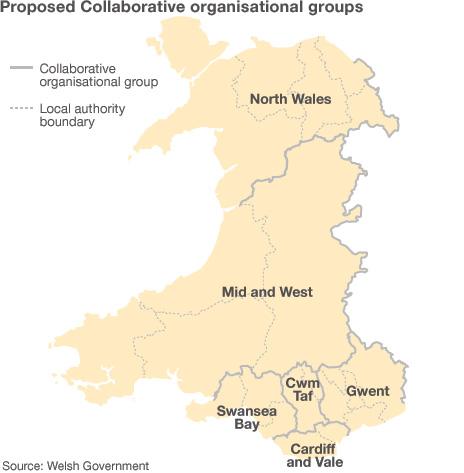Blueprint revealed for shake-up in council services
- Published
The Welsh Government has denied it is planning to merge councils "by the back door" after revealing a blueprint for radical reform of local government.
It wants six new regional groups to run services such as education and social care, rather than the 22 local authorities.
One council leader said it was time for a fundamental reorganisation of local authorities.
But there are no plans for a cut in Wales's 1,264 councillors.
The six proposed regions are North Wales, Mid and West Wales, Swansea Bay, Cwm Taf, Cardiff and Vale and Gwent.
Although councils will not be merged, ministers will insist they look to deliver services jointly within these six areas.
It would mean a major shake-up from the current way of delivering services, but ministers say there are risks with the current fragmented approach.
Local Government Minister Carl Sargeant has told the Cabinet the current collaborations are "pick and mix" with different councils working together on different policy areas.
He said: "This isn't reorganisation by the back door. This is about improving public services for the people of Wales.
"That's what people want. That's what I'm keen to deliver.
"People who are saying that really are just using this as an excuse not to make a change in public services for the better."
The new boundaries are designed to match Local Health Board borders and police areas, to make it easier for services to be integrated with them.
The largest population of the new service delivery areas will be North Wales, with 686,000 people, covering six council areas.
Mid and West Wales will have 519,000 people across four councils, Swansea Bay 511,000 and three councils, Cardiff and Vale 455,000 and two councils, Cwm Taf 290,000 and two councils and Gwent 569,000 and five councils.
'Blueprint for reorganisation'
Liberal Democrat local government spokesman Peter Black said he was in favour of cutting the number of councils, but accused the government of reorganisation "by the back door".
He said: "This is a blueprint for reorganisation. I'm OK about having that debate, but let's have that debate, not ease our way there surreptitiously.
"Let's actually have a debate about what we want to do with local government. It seems to me that at the moment, the government and the ministers are floundering around without really knowing what they're doing - let's have a proper debate about whether we're going to reorganise or not instead of trying to do it by the back door."
The Welsh Government wants to introduce a new law in the autumn which will be aimed at forcing councils who are reluctant to share services to do so.

Labour promised at May's election that it would reorganise local authorities during this assembly term.
There are no plans to formally merge councils or cut the number of councillors. Councils can offer their members a basic allowance of up to £13,868 a year, with more for leaders and committee chairs.
Gwynedd council leader Dyfed Edwards said the current situation of 22 local authorities was "unsustainable" and had not changed in response to devolution.
He said: "Local government is the only part of Wales which hasn't changed in response to devolution - it's still doing things exactly the way it did before.
"We need to reorganise councils in Wales, but the government doesn't want to go there, it says because of the cost. Well there are are costs to not reorganising.
'Fundamental questions'
"Instead, we have this plan B, of collaboration, which raises fundamental questions, not least of accountability.
"In the end, we'll have to reorganise, as the current structure is unsustainable. We're a small country - there are some services currently being provided on a local basis that could easily be provided on a national basis."
Wales's local government map has been redrawn several times.
There were 13 shire authorities and two city councils until 1974 when they were replaced by eight councils.
Those counties, including Gwent and Dyfed, were abolished in 1996 when the 22 councils were created.
BBC Welsh affairs editor Vaughan Roderick said there was a consensus in the assembly and local government that 22 councils are too many.
"The problem is this: the government doesn't want to have a reorganisation," he said.
"It says it would be costly, it would take time, it wouldn't deliver efficiencies.
"What they have been trying to do is to get councils to co-operate with each other. Some of that has been going on, but not enough for the government."
A spokesman for the Welsh Local Government Association, which represents councils, said the plans would be discussed at its next major meeting at the end of the month.
- Published1 September 2011
- Published4 December 2010
- Published14 February 2011
- Published28 January 2011